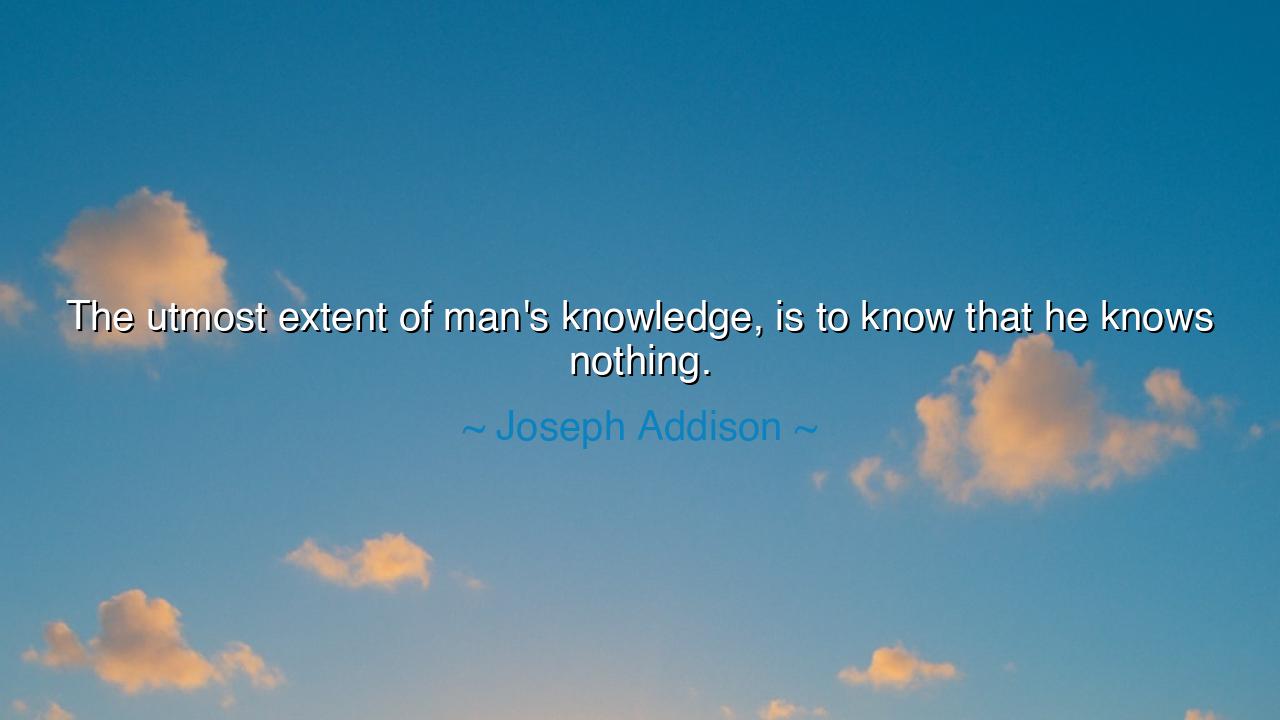
The utmost extent of man's knowledge, is to know that he knows






When Joseph Addison, the philosopher, essayist, and moralist of the Enlightenment, wrote, “The utmost extent of man’s knowledge, is to know that he knows nothing,” he was echoing an eternal truth whispered through the ages — that wisdom begins with humility. In this simple yet profound statement, Addison joins a lineage of great thinkers who saw the limits of human understanding not as defeat, but as revelation. For in recognizing the boundaries of our own knowledge, we awaken the desire to seek truth beyond ourselves. To know that one knows nothing is not despair — it is the beginning of enlightenment.
The origin of this idea reaches back to the ancients, most famously to Socrates, who declared before his accusers, “I know that I know nothing.” It was a paradox meant to shatter the arrogance of those who mistook learning for wisdom. Addison, living centuries later, revived this truth for a modern age intoxicated by the rise of science, commerce, and reason. He reminded mankind that no matter how far intellect advances, it must still bow before the vast mystery of existence. The stars may be charted, the seas crossed, and the atom split, yet the soul — the why behind all creation — remains veiled. Thus, humility is not ignorance, but reverence before the infinite.
In Addison’s world, where empires expanded and new philosophies arose, this reminder was both timely and eternal. Knowledge was growing faster than morality could contain it. Men were building machines and theories, but forgetting the spirit that should guide them. To Addison, the greatest danger was not ignorance, but pride disguised as knowledge — the belief that humanity could master all without understanding itself. His words are a warning as much as a teaching: that when knowledge forgets its limits, it becomes arrogance, and arrogance always leads to ruin.
History bears witness to this truth. Consider the tale of Prometheus, who stole fire from the gods to give to man. His act was born of wisdom but carried the punishment of pride — for fire, like knowledge, can warm or destroy. In another age, the Library of Alexandria, that jewel of ancient learning, perished in flames — a symbol of how fragile human knowledge truly is. Every generation believes itself wise, yet time humbles them all. Kingdoms fall, theories fade, and discoveries once hailed as final truth are swept aside by new ones. Thus, the wise understand that knowledge is a river without end, and the moment we think we have reached its source, it flows beyond us again.
Addison’s insight, though clothed in the language of his time, speaks to every soul that seeks truth. The utmost extent of knowledge, he says, is not mastery, but awareness — the understanding that human wisdom is but a flicker against eternity’s dark horizon. This realization is not despairing, but liberating. For when we accept that our understanding is incomplete, we open the heart to wonder, to curiosity, to the humility that precedes discovery. To “know nothing” is not to be empty; it is to be ready — ready to learn, to listen, and to grow.
There is a quiet heroism in this humility. The scientist who admits uncertainty, the philosopher who questions his own reasoning, the artist who seeks beauty he cannot define — these are the heirs of Addison’s wisdom. They understand that truth is not a possession, but a pursuit. The greatest minds in history — from Galileo to Einstein — have all, at the height of discovery, looked into the cosmos and confessed their smallness. In their humility lay their greatness.
The lesson of Addison’s words is thus both moral and practical: never mistake knowledge for wisdom, nor certainty for truth. Learn deeply, but hold your learning lightly. Approach the mysteries of life not with arrogance, but with awe. Ask questions more often than you give answers. And when you are tempted to boast of what you know, remember that even the wisest man sees but a few stars in an infinite sky.
So let Addison’s teaching be passed down like sacred flame: that to know one’s ignorance is the beginning of wisdom. For in humility, knowledge is made pure; in wonder, the mind is renewed; and in acknowledging the limits of human understanding, we find the doorway to divine truth. To know that we know nothing — that is not weakness. It is the first, and greatest, act of wisdom.






AAdministratorAdministrator
Welcome, honored guests. Please leave a comment, we will respond soon